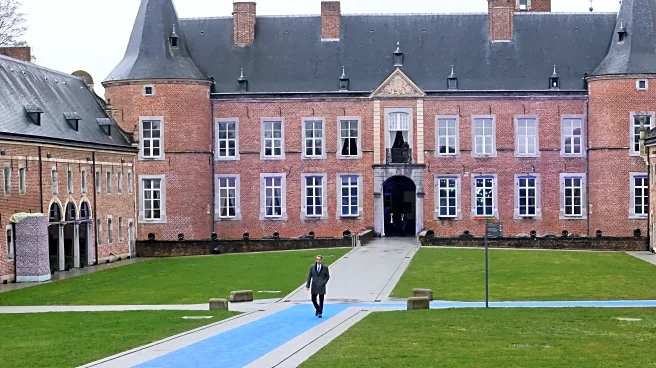What's Happening?
Claire-Louise Bennett's latest novel, 'Big Kiss, Bye-Bye,' delves into the complexities of modern heterosexual relationships, exploring themes of 'heteropessimism'—a term coined by Asa Seresin to describe a sense of regret and hopelessness about straight
experiences. The novel follows an unnamed protagonist navigating life post-breakup, engaging in correspondence with past lovers and contemplating a move to the countryside. Bennett's narrative style is characterized by its linguistic inventiveness and introspective monologues, offering a subtle critique of gender pessimism. The book also references cultural works like 'The Piano Teacher,' highlighting its bleak view of relationships.
Why It's Important?
Bennett's novel is significant as it reflects broader societal shifts in gender dynamics and romantic expectations. The rise of 'heteropessimism' indicates a growing disillusionment with traditional heterosexual relationships, influenced by changing gender roles and the impact of digital dating. This narrative resonates with contemporary discussions on gender politics, as seen in various media and cultural critiques. The novel's exploration of these themes provides insight into the evolving landscape of romantic relationships, challenging readers to reconsider the impact of societal norms on personal connections.
What's Next?
As Bennett's novel gains attention, it may spark further discourse on the future of heterosexual relationships and the cultural narratives surrounding them. Readers and critics might engage in discussions about the implications of 'heteropessimism' and its portrayal in literature. The book's reception could influence future literary works and cultural conversations, potentially leading to a reevaluation of romantic ideals and expectations in modern society.
Beyond the Headlines
The novel's exploration of gender dynamics also touches on the influence of U.S. cultural and political issues, as characters discuss topics like U.S. foreign policy and social conservatism. This highlights the global reach of American cultural narratives and their impact on personal relationships. Bennett's work encourages readers to consider the intersection of personal and political spheres, questioning how societal trends shape individual experiences of love and intimacy.


















